#Manpower Middle East
Explore tagged Tumblr posts
Text
Find Jobs & Talent with Manpower Middle East – Staffing Experts

Introduction
Finding your dream job or the dream candidate isn't always easy. Manpower Middle East is here to assist you! One of the Middle East's leading headhunters, they possess the skills to place skilled professionals with excellent companies. Whether you seek your dream job or the dream hire, Manpower Middle East makes it a breeze.
Why Manpower the Middle East?
Manpower Middle East is not yet another recruitment company. They are headhunting experts with many years of experience working in the Middle East. Their comprehensive insight into the local employment market, cultural diversity, and sectoral demands is what renders them top-rated middle east headhunters both for companies that recruit talent and job applicants alike.
How Manpower Middle East Operates on behalf of Job Applicants
Looking for work? Manpower Middle East does all the legwork. They:
Evaluate your professional objectives and skills
Match you with relevant job listings
Provide you career guidance and interviewing skills
Bargain your wages and deals for you
How Manpower Middle East Serves Businesses
Employers don't accept just anything, so Manpower Middle East assists them in obtaining it. Their products and services range from:
Gathering experienced workers quickly and efficiently
Conducting background verifications to assure qualifications
Serving payroll and HR services on behalf of contractual employees
Providing industry-targeted recruitment services
Industries Served by Manpower Middle East
Manpower Middle East provides expertise in a range of industries including:
Oil & Gas
Healthcare
Finance & Banking
Technology & IT
Retail & Hospitality
Construction & Engineering
The Middle East Headhunter's Role in Recruitment
Middle East headhunters become a bridge to connect talent to opportunity. They:
Identify and spot potential candidates of high potential
Recruit professionals directly for individual career placements
Guide employers on strategic recruitment decisions
Permanent and Temporary Staffing Solutions
Manpower Middle East offers both permanent and temporary staffing solutions. Regardless of whether the companies need full-time employees or contract staff for a short while, they have the right solution for them.
How to Register with Manpower Middle East
It's easy to get started! Simply:
Visit their website and register a profile.
Upload your resume and vital information.
Browse job vacancies and apply.
Contact recruiters for one-on-one support.
Key Benefits of Using Headhunters in Middle East
Career opportunities that are not available elsewhere
Expert guidance from career experts
Quick hiring
Influential connections with leading local employers
Job Applicants: Tips on Being Noticed
Got a dream to make the cut? Here are your guide:
Keyword your CV.
Treat yourself to an influential LinkedIn presence.
Become BFFs with recruiter and industry players.
On-going professional skills development and training.
Tips on How to Recognize the Ideal Staff by Employers
Customized job postings prior to recruitment.
Utilize multiple approaches for employee sourcing.
Competition-value salaries and welfare packages.
Team up with professional recruiters such as Manpower Middle East.
Shared Hiring Challenges & How Manpower Middle East Overcomes Them
From talent shortages to the kind of high turnover rates that drain your resources, hiring can be challenging. Manpower Middle East addresses these problems with:
Evidence-based recruitment approaches
Comprehensive candidate screening procedures
Tailor-made staff solutions
Success Stories: How Manpower Middle East Reshapes Careers
Real individuals, real success! Many professionals have landed life-changing employment through Manpower Middle East, while businesses have found the talent that transformed their companies.
Future Trends in Recruitment & Staffing in the Middle East
The future of recruitment is evolving! Trends to watch are:
AI-based recruitment solutions
Remote and hybrid work patterns
Growing demand for digital skills
Greater focus on employee well-being
Conclusion
As an employee or job seeker, Manpower Middle East streamlines the hiring process. With experienced headhunters in the Middle East, tailored recruitment solutions, and industry insight, they are your staffing partner of choice. Alliance Recruitment Agency also provides specialized staffing services. Start your search today and get the perfect job or talent with ease! For more information, contact us today.
View source: https://allianceinternationalservices.medium.com/find-jobs-talent-with-manpower-middle-east-staffing-experts-95e6a6c11323
0 notes
Text
Recruitment Specialists in the Middle East: Bridging Talent with Opportunity
The Middle East remains a center of high-speed economic growth, infrastructure expansion, and strategic change. From oil to schooling, building to medicine, the region offers rich opportunities—but also considerable challenges—when it comes to creating a skilled and sustainable workforce. With this ever-changing landscape, Middle East recruitment specialists are key to bridging the link between employers and talent, facilitating expansion, and advancing national visions within Gulf Cooperation Council (GCC) states and beyond.
The Role of Recruitment Specialists Recruitment specialists act as the bridge between employers and job seekers, streamlining the hiring process and ensuring the right match for every role. In the Middle East, their role has expanded significantly over the past two decades, especially as governments seek to diversify economies and reduce reliance on oil.
These individuals do more than recruit CVs—they have industry sector expertise, offer market intelligence, and facilitate both employers and candidates through each phase of the recruitment process. They frequently handle candidate screening, interview scheduling, contract negotiation, induction, and, in some instances, post-placement assistance.
Why Middle Eastern Recruitment Specialists are Important
Workforce Demographics Diversity The Middle East has one of the most heterogeneous workforces globally. In most states—such as the UAE, Qatar, and Bahrain—a majority of the workforce consists of expatriates. Recruitment consultants play a critical role in bridging the cultural, language, and regulatory issues involved in such heterogeneous recruitment environments. Through their experience, companies are able to employ workers who can become successful members of multinational teams.
Localization and Nationalization Programs Various nations in the region have enacted localization initiatives that seek to raise the employment of natives. Saudization in Saudi Arabia and Emiratization in the UAE are some of the examples. Recruitment experts ensure employers meet these national requirements without compromising the operational effectiveness and quality of employees. The specialists also interact with government officials to grasp legal regulations and quota demands.
Industry-Specific Hiring Needs Every sector has specific recruitment challenges. Construction and infrastructure developments, for example, demand large-scale deployment of skilled labor, frequently international. Technology firms, on the other hand, seek highly specialized talent in areas such as AI, cybersecurity, and data analytics. Recruitment Specialists Middle East provides tailored solutions for these diverse needs, ensuring that businesses can tap into the appropriate talent at the optimal moment.

Key Sectors Driving Demand for Recruitment Services Several sectors across the Middle East are actively driving demand for recruitment specialists:
Construction and Real Estate: With ongoing mega-projects such as NEOM and Expo City, the need for engineers, project managers, and skilled labor remains high.
Healthcare: Investments in public and private healthcare systems have led to a demand for doctors, nurses, and medical technicians across the region.
Information Technology: With smart city projects and digitalization picking up speed, IT professionals—from software engineers to cloud architects—are in great demand.
Finance and Banking: Recruitment within this industry is concentrated on positions like compliance officers, investment analysts, and experts in digital banking.
Education: Most nations are revolutionizing their education system, which is generating a demand for trained teachers, school managers, and e-learning professionals.
Challenges Recruitment Specialists Face Despite the increased relevance of recruitment specialists, many issues exist:
Talent Shortages Though the need for top talent is increasing, local supply can be limited in many cases, particularly for technical and specialized positions. This creates intense competition among employers and greater demands from candidates.
Changing Regulatory Environments Visa regulations, labor legislation, and labor policies can differ significantly and shift quickly throughout the region. Recruitment professionals need to remain current and guarantee complete compliance, particularly when recruiting expatriates.
Turnover and Retention Problems It's not enough to find the right candidate. Keeping them on board is equally important. High turnovers in industries such as hospitality and retail still pose problems, so recruiters are paying closer attention to cultural fit and alignment over the long term.
Remote and Hybrid Work Arrangements Remote work has brought opportunities and challenges. On the positive side, it opens up talent sources, but on the other hand, it creates issues around coordination, online induction, and sustaining productivity across geographies.
Changing Strategies in Hiring To address contemporary needs, hiring experts in the Middle East are changing strategies:
Data-Driven Recruitment Analytics is also becoming an important recruitment tool. Through the use of data, experts can forecast hiring demand, monitor candidate interactions, and measure recruitment performance. This leads to smarter decisions and better hiring.
Utilization of AI and Automation Artificial intelligence is simplifying many phases of the hiring process—from screening resumes to scheduling interviews. Automation enables recruitment professionals to spend more time on strategic and relationship-building activities instead of administrative work.
Enhancement of Candidate Experience Recruitment experts are placing more emphasis on enhancing the candidate experience. Efficient communication, feedback cycles, and customized interactions are becoming priorities to secure top talent and establish employer brand trust.
Strategic Talent Mapping In addition to reactive hiring, recruitment is turning more proactive. Talent mapping enables businesses to identify and approach future talent well in advance, building pipelines for key positions and saving time-to-hire.
Opportunities for the Future The future provides much promise for the recruitment professional in the Middle East. As innovation and inclusivity continue to gather pace in the region, there are a number of opportunities arising:
Localization-Focused Talent Development: Recruitment experts are helping to narrow the gap between employment and education for national residents. Partnerships with education and training providers are on the rise.
Freelance and Gig Economy Expansion: Nations such as the UAE have launched freelance visas, unleashing the potential for flexible workforce solutions. Experts are now considering freelance and project-based assignments as potential options.
Sustainability and Green Employment: With increased emphasis on sustainable development, new professional roles are becoming visible in environmental science, clean energy, and ESG (environmental, social, and governance) sectors.
Cross-Border Cooperation: Increased cooperation among nations within the MENA region is making it easier for talent mobility. Recruitment professionals play a key role in facilitating these regional alliances and determining talent availability across borders.
Conclusion Middle East recruitment professionals are leading the region through a revolutionary era. Their experience, flexibility, and extensive knowledge of both international and regional dynamics are integral to the construction of a long-term workforce in the region. As industries evolve and economies diversify, these professionals will keep defining the labor market, providing strategic assistance to employers as well as job seekers. Whether it is navigating advanced regulatory systems or finding specialized talent, their role is not going away anytime soon, driving organizational excellence and sustainable growth in the Middle East.
#manpower supply middle east#top recruitment agency in the middle east#recruitment middle east#top recruitment companies in the middle east#best recruitment consultancy in the middle east#staffing middle east
0 notes
Text

Are you looking for Skilled Workers from India, Nepal, Bangladesh, Sri Lanka, and the Philippines?
#skilled worker#plumber#electrician#mechanic#operator#driver#technician#gulf#middle east#manpower#skilled job
0 notes
Text
One of the major legacies of the British control of India was the planting of peoples of Indian origin all over the British Empire, including Britain itself. India was considered to be a reservoir of cheap labour. After African slavery was legally ended in 1833, ‘indentured’ labourers were recruited from India to work on plantations in Mauritius, Guyana, Trinidad, and Jamaica. This was slavery in a new guise: many laboured under conditions no less degrading than slavery. Thereafter wherever need arose, Indian labour was employed. Indians worked in the plantations and mines in Ceylon, Malaya, Burma, South Africa and Fiji. Indian labour provided the manpower to build the East African Railway. Indian sailors worked the British merchant navy. Indian soldiers not only helped to maintain the British Raj in India, but were used as cannon fodder overseas in colonial wars of conquest to extend its frontiers.
Indians were brought to Britain too. They did not come as ‘indentured’ labourers, but the principle of cheap labour applied here as well. Many Indian servants and ayahs (nannies or ladies’ maids) were brought over by British families returning from India. Indian sailors were employed by the East India Company to work on its ships. Some of these servants and sailors settled permanently in Britain.
One of the results of the policy of introducing western education in India was that, from about the middle of the nineteenth century, many Indian students began arriving in Britain, some on scholarships, to study law or medicine or to prepare for other professions. Some came to take the examination for entry into the Indian civil service since this examination could only be taken in London. Some Indian students settled in Britain after qualifying, to practise as doctors, lawyers or in other professions. Some Indian business firms opened branches in England. Nationalist politicians came to London, the centre of power, to argue the cause of Indian freedom. Indian princes and maharajahs visited England, not only as guests of the Crown on formal occasions, like the coronations, but also to pay their ‘respects’ to the monarch or for pleasure. London, as the metropolitan capital, attracted many visitors from India. Exhibitions of Indian arts and crafts were displayed in England too. The Asian presence in Britain therefore goes a long way back and forms a prelude to the post-independence migration of Asians to Britain.
— Rozina Visram, Ayahs, Lascars and Princes: Indians in Britain, 1700-1947 (London: 1986), pp. 9-10.
159 notes
·
View notes
Note
If the person trying to “tread on you” was representing Israel (say they were demanding hundreds of billions of dollars of your money) would it be okay for them to tread on you then?
You're setting up a false dichotomy here. Not surprising from a Jew hater, but still, pretty lame.
Your assumption is that any money given to Israel is indicative of some sort of unequal relationship in Israel's favor. You seem to think that there's no reason to ever support Israel other than being forced to. In reality, there are many good reasons to support Israel beyond the obvious moral and humanitarian ones. Israel is a stable ally in a very unstable region. Just in the last two years they've destroyed Hezbollah and nearly destroyed Hamas, two terrorist organizations that want to attack and destroy the US. They've weakened Iran, another hostile power that wants to destroy us, and brought them to the negotiating table. All of this without the US needing to send a single American soldier overseas. I think that's worth some monetary support. We're certainly getting more out of our support for Israel than we are for all the billions we spend in Europe and on NATO.
Israel is also a good diplomatic tool for helping to westernize hostile Muslim nations. The Abraham Accords are a great step towards blunting the radicalism of certain Arab states. And if you want blunt pragmatism, every single country and terrorist group in the middle east that wants to destroy Israel also wants to destroy us. Israel's existence draws most of that aggression since they're a much closer target, so money and manpower that would be turned against innocent Americans is being turned against Israel instead.
But mostly, helping to defend Israel is the right thing to do. It doesn't cost us much, and they've never demanded more than we can give. They're a good ally, and it's always a good idea to support good allies.
None of that equals being treaded on.
45 notes
·
View notes
Text
Okay yeah I’m still thinking about logistics. I am aware that lord of the rings is whimsical and I don’t care.
There must be so many people in Rivendell. It’s the Last Homely House, the last decent place before you go off into the deep wilderness. It’s at the bottom of a valley in the middle of nowhere. They aren’t getting everything imported. Elrond must have a full sized settlement there to produce most of the food, even if we are assuming that preserving magic makes it an easy place to live. Rivendell is a refuge too. It’s home to Elrond, his family, a significant number of Noldor like Glorfindel, and who knows how many wanderers. Elves don’t die of old age, and in the Third Age they don’t get murdered particularly often either, so I have to imagine that the population is large and just keeps growing. I don’t get the sense that many travel across the sea until after Sauron falls, and there really isn’t anywhere else for them to go. Lothlorien, maybe? There’s got to be thousands of people in that valley, supporting the Last Homely House and keeping the forces of darkness at bay.
More than that, it’s a huge place fit for the most powerful people in Middle Earth. Rivendell can easily accommodate Bilbo’s entire party in the hobbit and all of the visiting diplomats for the Council of Elrond. Do you have any idea how much manpower (elf power?) it takes to keep a place clean, well-lit, and functional without modern technology? It takes an absurd amount of work. There is nothing in the legendarium that I’m aware of to suggest that elves use magic as a labor saving tool. That means that people are doing all of that work by hand.
Are there elven servants in Rivendell? What about in Valinor? In the Silmarillion, we only ever really read about noble bloodlines, and in LoTR, elves are kept very mysterious. There’s craftsmen who make silmarils and magic rings, but who is forging gear for the average soldier? We know that there are a whole lot of average soldiers. Lord of the rings is a story of battles between armies. Is there upward mobility in an undying land? Whoever is cleaning clothes in Valinor, have they been doing that since the age of the two trees?
Maybe Valinor is more equal than that. Maybe in a place where everyone expects to live forever, they’ve found ways to share the load. But they did have a high king, long ago, and Feanor uses the argument that the elves should go to Beleriand to find freedom and treasure. He’s not a reliable narrator, but it’s something I’ve been thinking about.
What must it be like to be one of the other Noldor? To be a common elf and go east seeking freedom and adventure, only to find suffering like you cannot imagine? To watch that land sink beneath the ocean, to see Numenor be corrupted and fall, to fight Morgoth and Sauron and Sauron again? To finally leave it all behind as everything, even Rivendell and Lindon and Lothlorien, fades? Or maybe you die in combat and spend an eon in the halls of Mandos before reawakening in Valinor. Either way, you’re back!
And someone needs to do the laundry.
#by me#tolkien#the silmarillion#lord of the rings#this is a very rambling post but this is tumblr after all
64 notes
·
View notes
Text

while i know the game tries to point-blank say the south fell entirely to the blight in an effort to likely set up a soft world-reboot for future matters, as far as my own canon, i diverge pretty heavily from that in veilguard and post-veilguard verses.
as long as it's happening in a world where Regin is inquisitor, there's a couple of very important things that apply to my thedosian canon (whether or not Litriu is this world's hero of ferelden, but i do default to li being the HOF when Regin is Inquisitor. it just helps me streamline how i want the world to be working.)
for starters, Litriu and a handful of 'her' wardens defied the First Warden's orders, and did not recall to weisshaupt. they remained in vigil's keep and amaranthine to help combat the Blight, because Litriu has been using vigil's keep as the place she returns to ever since the events of Awakening. She's been traversing all of Thedas looking for a cute for the Blight and the Calling (and reminder that in her own canon/my canon, she IS successful through the use of great dragon blood that she obtains in the wilds of Antiva, and secretly begins distributing, first to her own wardens and companions, and then to the Order after the events of Veilguard (or has distributed, depending on how things end for her with Veilguard). So, during the events of Veilguard, Amaranthine functions almost as a forward-camp, a bastion for those helping to combat the evanuris and the Blight, and is run by Litriu or by a chosen Second.
furthermore, through the events of Inquisition, Regin placed Briala in power- and also gained a lot of blackmail material and information that she'll be able to leverage. she placed leliana (hardened) into the position as divine, and all of this was essentially her setting up with one goal in mind-
pressuring briala and gaspard into returning the Dales to elvhen sovereignty. (by which I mean; the Exalted Plains, the emprise du lion, and the Emerald Graves.) by using her own almost 'deified' identity as inquisitor and chantry-figure, the weight of the divine, this IS successful- though it takes time and does result in multiple assassination attempts against herself and against Briala and Gaspard. she may have only learned to play chess during Inquisition, but she learned well- and set up a hell of a long endgame, to ensure that even if she died in the process, the Dales returned to the elves. it's why at TIMES in conversations with chantry-officials during Inquisition, Regin would neither confirm nor deny anything to do with Andraste or the Maker after being made Inquisitor.
anyways.
during the events of Veilguard, Denerim falls as do most eastern Ferelden cities- i imagine that the forces of the Evanuris didn't just sweep down from the North and blanket the continent; i feel like they would have made almost more of a pincer-movement, the horrors of the Blight creeping out of the Brecilian forest alongside agents like the Antaam or Venatori, taking the easternmost border of ferelden entirely and sweeping west- whilst forces from the evanuris did the same thing on the northwesternmost side of Orlais - surging down as an incursion from the Anderfels and swept east, with the intent of meeting in the middle.
the city of Amaranthine also falls again and is burned to rout the Blight and to try and belay the surge of the Blight, but only Vigil's Keep ends up spared that awful fate. redcliffe doesn't entirely fall but is badly damaged by the Blight and is left only about half-habitable. Regin and Morrigan use their connections through the Crossroads and Eluvians to strategize with Litriu and with Orzammar, and they end up making an almost 'perimeter' with manpower, magic, wards and stone- about half of the Hinterlands (the westernmost half), parts of the Korcari wilds, and the entirety of the Frostback mountains and basin serve as the perimeter- that is the line that they keep the Blight off of at all costs, keeping Skyhold as the main place to protect refugees. this is mostly successful, beyond small scars of the land where the Blight and its' agents of corruption did manage to encroach before being burned out. anora does not fall with denerim and she escapes to either redcliffe (which she then uses as her own base of operations, coordinating with Li and with Regin) or she uses it as a waypoint before falling back to Skyhold entirely. much of ferelden's army does manage to recover themselves within redcliffe- i would say about 35-40% of ferelden's army is lost when Denerim falls. Crestwood is somehow spared from entire corruption and ruin, but the storm coast is very nearly consumed. Lothering is lost, as is the majority of the Bannorn- however while Amaranthine is ruined and Vigil's Keep is protected, Highever manages to remain standing, though only barely. West Hill and most of the Storm Coast are consumed by the Blight- and the Fallow Mire is almost entirely covered in it, the land buried beneath the rot and tendrils.
as far as Orlais' side of the map goes- the Dales themselves are the perimeter, because the Evanuris moved so fast that Regin and her forces were not able to organize quickly enough to stop that encroachment- the world after all in the events of the last Exalted Council of Halamshiral had done its' absolute best to strip the Inquisitor of all of the power they'd begged her to take, and thus she didn't have enough forces or legitimacy until after Val Royeaux had already fallen- and Gaspard with it, though Briala was able to escape and breach the eluvians with a small force to warn Regin and set things into motion. The Dales themselves (the plains, the emprise du lion, and the emerald graves) alongside part of the Armor Wilds serve as the perimeter- are where the borders are set into place to keep back the Blight. There are scattered pockets and cities/villages in Orlais that do not fall- the map isn't entirely wiped clean with corruption and ruin- but the majority of Orlais is laid to waste- the evanuris focused more heavily upon Orlais than Ferelden in my opinion, due to the events of the world that they've watched- and i don't think they did this in any way to 'avenge' the elvhen, but out of rage that Orlais, like Tevinter, try to model itself in THEIR image but claim all of it to come from its' own mind and inspiration rather than admitting how much of their culture and structure were scavenged from the carcass of the empire that they built.
regin works with morrigan, litriu, briala, leliana, (gods i love women LMAO) and with rook to maintain these borders, using Skyhold as a base of operation, but keeping herself moving almost constantly, so that no one can ever be sure of where she is long enough for an organized attempt at 'cutting off the head' of the Southern resistance. as such she will also, at times, join Rook in the Lighthouse for strategy and for debriefing of information so that they can keep as up-to-date as possible and keep the flow of information moving between them. she ALSO, at times, will join Rook in the field so that she can keep apprised of movements of the factions that are most heavily operating in the north and in the monsters and tactics the evanuris are using.
after the end of Veilguard, much of the Blight recedes- it calcifies and dies in many places, though not all. i think it does in a way become easier to cure using litriu's discovery of the great dragonsblood- perhaps to the point that high dragon blood could also be used, if not as a total-cure than as a 'management' substance until that which can cure it can be introduced. orlais and ferelden are respectively about 70% and 55% ravaged by the Blight and the scars are deep- but they will recover.
Skyhold itself is untouched, mercifully, and remains strong and proud- but Orlais is left with the entire ruling bloodline wiped out, and Ferelden having to rebuild almost its' entire infrastructure and seats of power.
orzammar fares the best, i think. they neither lost their seat of power nor their ruling family and bloodline, and their efforts alongside regin and the inquisition establish them firmly with the entire south owing them a rather massive debt.

#[ thedosian worldstate headcanons ] burn the bed and the dreams i've never met so those wishes were never for granted#[ important: now i'll hold it in my heart ]#[ litriu headcanon ] no i never sold my soul if i ever do throw my bones to the wolves#[ regin headcanon ] the sound of the wind is whispering in your head oh can you feel it coming back?#[ harrow headcanon ] everything's alive and wild and dying an there's beauty in the sweat the blood the crying#[ long post cw ] all the secrets of the dark
8 notes
·
View notes
Photo

Battle of Bir Hakeim
The defence by Free French forces of the remote desert watering hole of Bir Hakeim (Hacheim) in Libya, North Africa in May-June 1942 during the Second World War (1939-45) is one of the most heroic episodes in French military history. Although ultimately unsuccessful, the defenders, which included units of the famed French Foreign Legion, held out for 15 days against four German and Italian divisions commanded by no less a figure than General Erwin Rommel (1891-1944).
The Axis forces attacked Bir Hakeim because it was part of the Allied Gazala Line defences, which protected the approach to the vital port of Tobruk. When finally overwhelmed, 2,700 Free French troops from an original garrison of 3,700 still managed to escape Bir Hakeim to fight another day. Meanwhile, Rommel defeated the rest of the Allied forces at the Battle of Gazala and captured Tobruk in June 1942, his greatest victory in North Africa.
French Foreign Legion, Bir Hakeim
Leonard Chetwyn - Imperial War Museums (CC BY-NC-SA)
The Western Desert Campaigns
In the first years of the second year of WWII, the Allies, then principally British and Commonwealth forces, were especially keen to protect the Suez Canal from falling into enemy hands, that is into the control of the Axis powers Germany and Italy. North Africa was also strategically important if either side wished to control and protect vital Mediterranean shipping routes. The island of Malta was crucial in this role, and holding the island fortress (then in British hands) was another reason to control potential airfields in the North African desert. Finally, North Africa was, at this stage of the conflict, the only place where British and French troops could fight a land war against Germany and Italy. After the embarrassing debacle of the Dunkirk Evacuation and the humiliating Fall of France in 1940, any military victories at all would be a vital morale boost to the Allies.
For all of the above reasons, a series of desert battles ensued, which are collectively known as the Western Desert Campaigns (Jun 1940 to Jan 1943). At first, the British Eighth Army faced poorly equipped Italian forces, but these were soon considerably boosted by German troops with superior armour, weapons, and training. From January 1941, the Axis forces in Africa benefitted from the considerable command abilities of General Erwin Rommel, a man who had already gained a reputation as a master of fast armour tactics during the Fall of France in 1940. Rommel first commanded the specialised Deutsche Afrika Korps (DAK) and proved his worth by capturing El Agheila in March 1941 and then Mersa Brega on 1 April. By July, Rommel was in overall practical command of all German and Italian forces in North Africa, although he was still technically under the ultimate authority of the Italian high command. Two victories against Allied offensives in May and June (code-named Brevity and Battleaxe, respectively) were followed by defeat in a third offensive in November, code-named Crusader. Rommel's two persistent problems were insufficient manpower and lack of supplies (especially food, fuel, and ammunition), but by January 1942, this situation improved significantly, and the German general, ignoring his orders to emphasise defence, went on the attack.
The British Eighth Army, which was composed of a range of British, British Empire, and Free French troops, was commanded by Lieutenant-General Neil Ritchie (1897-1985). The overall commander of Allied troops in the Middle East was General Claude Auchinleck (1884-1981). Unfortunately, at this stage of the Western Desert Campaigns, the British Army was poorly equipped, poorly trained, and poorly led. In contrast, "Rommel's force was numerically inferior, but his troops were more professional, better led, and thoroughly steeped in the cooperation of all arms" (Dear, 992).
General Rommel on Campaign
Imperial War Museums (CC BY-NC-SA)
Continue reading...
25 notes
·
View notes
Text
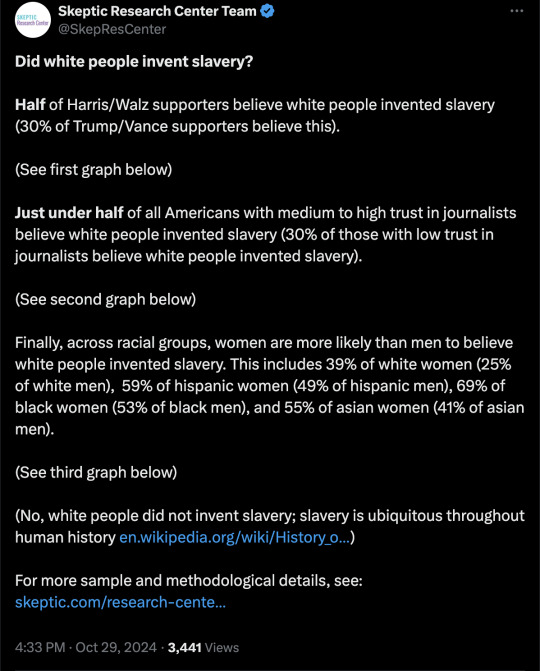

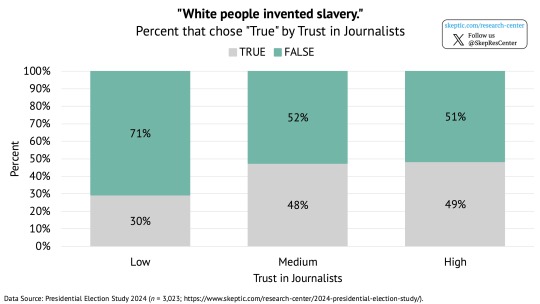

==
Not only did white people not invent slavery - slavery existed for thousands of years before anyone travelled far enough to encounter other races - but it was Europeans who invented the principled opposition to it: abolition.
For most of its long history, which includes most of the history of the human race, slavery was largely not the enslavement of racially different people, for the simple reason that only in recent centuries has either the technology or the wealth existed to go to another continent to get slaves and transport them en masse across an ocean. People were enslaved because they were vulnerable, not because of how they looked. The peoples of the Balkans were enslaved by fellow Europeans, as well as by the peoples of the Middle East, for at least six centuries before the first African was brought to the Western Hemisphere.
Before the modern era, by and large Europeans enslaved other Europeans, Asians enslaved other Asians, Africans enslaved other Africans, and the indigenous peoples of the Western Hemisphere enslaved other indigenous peoples of the Western Hemisphere. Slavery was not based on race, much less on theories about race. Only relatively late in history did enslavement across racial lines occur on such a scale as to promote an ideology of racism that outlasted the institution of slavery itself.
Wherever a separate people were enslaved, they were disdained or despised, whether they were different by country, religion, caste, race, or tribe. The Europeans who were enslaved in North Africa were despised and abused because they were Christians in a Moslem region of the world, where they were called “Christian dogs.” Race became the most visible difference between slaves and slaveowners in the Western Hemisphere. As distinguished historian Daniel J. Boorstin put it: “Now for the first time in Western history, the status of slave coincided with a difference of race.” To make racism the driving force behind slavery is to make a historically recent factor the cause of an institution which originated thousands of years earlier. This enshrinement of racism as an over-arching causal factor accords far more with current instrumental agendas than with history.”
-- Thomas Sowell, "Black Rednecks & White Liberals"
The first country to abolish slavery was the United Kingdom in 1807. They then spent their time, money, manpower and political capital on convincing other countries to do likewise.
Nowhere was this more dramatically demonstrated than the West Africa Squadrons, which spent almost 60 years forming the Blockade of Africa, patrolling for, boarding and seizing slave ships.
Today, the largest populations of slaves in the world are located in countries in Asia, while the highest percentage of slaves per capita are found in MENA - the Middle East and North Africa.
The horrors of the Atlantic voyage in packed and suffocating slave ships, together with exposure to new diseases from Europeans and other African tribes, as well as the general dangers of the Atlantic crossing in that era, took a toll in lives amounting to about 10 percent of all slaves shipped to the Western Hemisphere in British vessels in the eighteenth century—the British being the leading slave traders of that era. However, the death toll among slaves imported by the Islamic countries, many of these slaves being forced to walk across the vast, burning sands of the Sahara, was twice as high. Thousands of human skeletons were strewn along one Saharan slave route alone—mostly the skeletons of young women and girls. These skeletons tended to cluster in the vicinity of wells, suggesting the last desperate efforts to reach water. Slaves who could not keep up with the caravans, often because their feet had swollen from walking across the hot sands, were abandoned in the desert to die a lingering death from heat, thirst and hunger. In 1849, a letter from an Ottoman official referred to 1,600 black slaves dying of thirst on their way to Libya. On another route, it was said that someone unfamiliar with the desert might almost be able to find his way just by following the trail of skeletons of people and camels.
Widespread loss of life began with the initial slave raids. As late as 1886, an Austrian who was an apologist for slavery nevertheless reported “Negro villages are burned, all the men killed, and their women and children are taken on months-long, terrible marches.” The march from slave-gathering areas, like the region around Lake Chad, across the Sahara Desert to the Mediterranean Sea took about three months and often only the strongest survived. Other slave routes to Islamic countries were over water, but this meant risking interception by the British Navy, and that in turn often meant that slaves were thrown overboard to drown rather than being allowed to remain on board to be discovered as incriminating evidence. The trans-Saharan caravan route was the most deadly, however. It has been estimated that, for every slave to reach Cairo alive, ten died on the way. Nor was Cairo exceptional. Missionary explorer David Livingstone, among others, estimated that several slaves were captured for every one that reached the Mediterranean alive.
Women were particularly vulnerable—and were more in demand than men. They brought higher prices in the Islamic countries, where they were widely used as domestic servants or as concubines. Ethiopian women sold for higher prices than Negro women, and white women from the Caucasus brought the highest prices of all. A special danger to men and boys was castration, to produce the eunuchs widely used in Islamic countries for work in the harems. Because the operation was forbidden under Islamic law, it was usually performed early—and often crudely—before reaching areas under the effective control of the Ottoman Empire. An estimated ninety percent of the men or boys died from the operation, though some groups of slave traders were sufficiently skilled to have much lower mortality rates. Eunuchs brought far higher prices than other slaves.
Dead and dying slaves were a common sight in the wake of a slave caravan. David Livingstone said that the “common incidents” of the slave trade that he had seen were “so nauseous that I always strive to drive them from memory.” For example: “One woman, who was unable to carry both her load and young child, had the child taken from her and saw its brains dashed out on a stone.” It was not only the Christian missionary Livingstone who was shocked by the brutality of Arab slave raiders and traders. So was Mohammed Ali, the ruler of Egypt, who was a battle-hardened military commander.
-- Thomas Sowell, "Conquests and Cultures"
The fact is that the percentage of students meeting the level of NAEP Proficient for U.S. History resides only in the teens. Not only is this a failure of the curriculum, but as we've seen, many teachers aren't so much "educators" as they are activists. So, literacy as far as World History can only be worse from there.

[ Source: NAEP Report Card: U.S. History ]
No wonder they're cheering on the terrorists.
#Skeptic Research Center Team#slavery#Thomas Sowell#white people#history#ignorance#historical revisionism#revisionist history#revisionism#religion is a mental illness
14 notes
·
View notes
Text















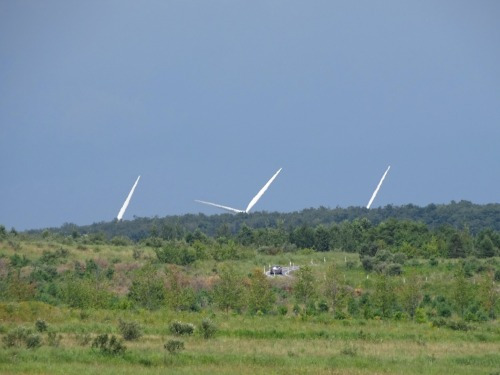




Global Wind Day
Global Wind Day is celebrated on June 15 every year. It’s an international event to raise awareness regarding the importance of wind energy and the power it holds to change the world, improve energy systems, and decarbonize economies. Investing in wind energy means spending less money on fossil fuel imports, resulting in a smaller carbon footprint and minimized CO2 for cleaner air on our planet. On this day, we learn not just about how wind power leads to a greener planet, but also about job creation and employment opportunities for many people.
History of Global Wind Day
The history of wind energy as a power source traces back thousands of years. As early as 5,000 B.C., Egyptians had already been using wind power to propel their boats on the Nile River. This was improved upon by the Chinese in 200 B.C. as they invented wind-powered water pumps. Furthermore, people from the Middle East and Persia discovered windmills with woven-reed blades to grind grain with more speed and less manpower, which eventually led to more efficient food production.
It wasn’t until the 1st century A.D. that Heron of Alexandria created the windwheel. According to historians, this was the first recorded wind-driven wheel to power a machine. It included a small windmill that powered a piston that forces air through the organ pipes. According to records, it made a sound like that of a flute.
In the Middle Ages, windmills became a popular device in Pakistan, Afghanistan, and Iraq. They were used to pump water and grind sugarcane, which eventually boosted their grist milling industry. This technology was ultimately brought to Northwestern Europe in 1180 and became a popular tool to grind flour — a system that still exists up to date.
In the late 1800s and early 1900s, colonists brought windmills to the United States. Homesteaders and ranchers installed thousands of water pumps and small wind-electric generations in Western America.
The possibilities of wind power were further explored due to oil shortages in the 1970s. This forced everyone to find an alternative source of energy to generate electricity. Due to this scarcity, the U.S. federal government installed thousands of wind turbines in California to encourage the use of renewable energy sources. By 2020, the U.S. share of electricity generation via wind power grew to 8.4% — a huge spike compared to the 1990s 1%.
Global Wind Day timeline
1st Century A.D. The First Wind-Powered Machine
Greek engineer Heron of Alexandria discovers the first wind-driven wheel that powers a machine.
1180s Vertical Windmills
Northwestern Europe uses vertical windmills to grind flour.
1900s 2,500 Windmills Reaches 30 Megawatts
About 2,500 windmills in Denmark produce a combined power of 30 megawatts used to grind grains and pump water.
1970s Global Oil Shortage
The global oil shortage leads people to explore wind energy in a more advanced manner to be an alternative to electricity.
1980s Wind Turbines in California
The U.S. Federal Government installs thousands of wind turbines in California in support of renewable energy sources.
Global Wind Day FAQs
What are the types of wind energy?
The three main types of wind energy are utility-scale wind, offshore wind, and distributed wind.
What are four manufacturers in the world that uses wind turbines?
Vestas (Denmark), Siemens Gamesa (Spain), Goldwind (China), and General Electric (U.S.)
Which country uses the most wind power?
China uses the most wind power, generating approximately 236,402 megawatts in 2019 alone.
How to Observe Global Wind Day
Fly a kite outside
Attend seminars about wind energy
Take it to social media
This may sound like a simple activity, but flying a kite outside is an effective way to explain to your kids how wind energy works. Discuss how wind power propels the kite to stay afloat in the air. It’s also a great bonding activity that’s both fun and educational.
In an era where the climate crisis is peaking, wind energy is the future. Attend seminars on Global Wind Day to learn about the benefits and new technologies of wind energy as an alternative power source. Educating yourself is key.
Raise awareness about wind energy and its benefits on social media. Share scholarly articles or Global Wind Day event pages to your newsfeed. Use the hashtag #GlobalWindEnergy and keep your friends and family in the loop about one of the most pivotal solutions to decarbonizing the planet.
5 Interesting Facts About Wind Energy
The wind industry solves employment problems
The first modern turbine
Commercial turbines are powerful
The largest wind turbine
It doesn’t need water
The wind industry employs 650,000 people in different capacities around the world.
The first modern turbine was built in Vermont, U.S.
One commercial wind turbine can provide power to 600 homes.
The largest wind turbine was created in Hawaii, which stands 20 stories tall and each blade is as long as a football field.
Wind energy is the only power source that doesn’t need water.
Why Global Wind Day is Important
It’s for the good of the planet
It raises awareness
Wind energy is cost-effective
With the rise of global warming and other crises, wind energy is one solution to help lessen pollutants. Its long-term effects are advantageous to the new generation and to the generations that will come after.
People need to be proactive in highlighting the benefits of wind energy so that companies, governments, and other industries will adopt this technology as an alternative power source. The only way to make them proactive is to raise awareness. Education is key.
Global Wind Day helps us support the cost-effectiveness of wind energy. It’s one of the lowest-priced energy sources known today, which could potentially lower federal taxes.
Source
#Spring Valley#Nevada#Appalachian Mountains#Somerset County#landscape#countryside#nature#Somerset Wind Farm#Oregon#USA#Shepherds Flat Wind Farm#Middelgrunden Wind Turbine Cooperative#Denmark#Copenhagen#wind turbines#original photography#travel#vacation#15 June#GlobalWindDay#Pennsylvania#flora#forest#Atlantic Ocean#energy source#tourist attraction#landmark#Global Wind Day#Linden Wind Farm#Washington
2 notes
·
View notes
Text
Manpower Solutions in the Middle East: Partner for Expert Manpower Middle East Services

For top-notch manpower in the Middle East, contact Alliance Recruitment Agency. We provide both on-board and remote staffing solutions for various industries worldwide. Our expertise ensures you get the right talent tailored to your specific needs. Let us help you build an exceptional team.
#Manpower Middle East#Middle East Staffing Solutions#Recruitment Middle East#On-Board Staffing Middle East#Remote Staffing Solutions#Middle East Talent Acquisition#Global Recruitment Services#Industry-Specific Staffing#Middle East Workforce Solutions#Talent Management Middle East
0 notes
Text
Why Partnering with a Contract Staffing Company in the Middle East Can Boost Your Business Success
Today, with a rapidly changing business environment, contract staffing companies have become a more prominent resource for Middle Eastern companies seeking to meet their workforce needs. Demand for special skills, continuously shifting market trends, and the emergence of new technologies drive a call for high agility and flexibility from modern businesses. One of the most efficient strategies today to stay competitive and maintain operational efficiency is to partner with a good contract staffing company in the Middle East.
We will look at why using contract staffing solutions is a means by which businesses can greatly enhance success, especially in the Middle East region. In terms of cost efficiency to access specialized talent, there are many and crucial benefits surrounding contract staffing for companies looking to grow, become innovative, and also adapt to changes in the market.
Understanding Contract Staffing in the Middle East Contract staffing involves hiring professionals temporarily to work for a certain duration in a specified role instead of permanently. Workers are hired primarily to support projects that last only for a few months, for seasonal jobs, or to service areas where particular skills are necessary. The dynamic economic environment of the Middle East, with changing businesses and corporations, necessitates contract staffing for workforce flexibility without permanent hiring commitments.
Working with a contract staffing company in the Middle East means that firms can have instant access to the pool of highly skilled, pre-screened professional resources to get deployed at business needs on priority. Be it a six-month project manager job or a one-off task execution requirement, contract staffing offers the answer that is highly efficient and effective.
Key Benefits of Partnering with a Contract Staffing Company in the Middle East
Access to Specialized Talent One of the top reasons companies go to a contract staffing company is for access to specialized talent. Many Middle Eastern industries, including IT, healthcare, finance, engineering, and construction, require a specific set of skills that are not always readily available in the local market. Partnering with a contract staffing company in the Middle East opens the door to a massive pool of candidates who have the required technical expertise and industry knowledge to excel in business. A contract staffing agency has relationships with professionals across various sectors and can bring the right person into an organization quickly for short-term contracts or project-based requirements.
Besides, the contract staff has the advantage of being an expert in his particular field, therefore suitable for only specific, high-skill work that might fall outside your permanent workforce. Thus, companies do not have to invest long-term in employees just to remain competitive and innovative over the short term.
Increased Flexibility and Scalability The business environment in the Middle East is usually dynamic, with market demands changing fast. It could be about responding to changes in consumer behavior, supply chain disruptions, or rapid business growth. Organizations have to scale up or down depending on the situation.
Contract staffing allows businesses to hire workers for short-term work without long-term commitments. This also allows for better adjustment of your workforce in order to meet the demands of projects or the changing nature of business. Also, working with a Middle East contract staffing company means that the firms are not bound by the classical hiring and firing cycles. Such flexibility keeps the businesses agile, prevents unnecessary overhead, and ensures the proper staffing level that will depend on operational needs.
Cost-Effective Solution Permanent employment carries a huge financial liability on the part of hiring full-time employees. Above the salary, these people require benefits, pensions, insurance, and other perks associated with permanent employment. These costs quickly add up due to the fact that your workforce may need to be expanded for only a limited period. Employers can save big on labor through the use of a Contract Staffing Company in the Middle East, as there's no need for benefits or even long-term obligations. Companies wouldn't have to spend time recruiting, interviewing, or training new talent because the temporary staffing agency took care of such tasks.
For businesses that only require specialized skills for specific projects, contract staffing becomes a very cost-effective solution. It allows them to hire the right professionals without committing to the long-term costs associated with permanent hires.

Faster Hiring Process Recruiting and hiring can be time-consuming processes, especially when you need to fill a role quickly. The traditional hiring process involves advertising, sifting through resumes, conducting interviews and evaluating candidates before making an offer. This can take weeks or even months, leaving companies understaffed and slowing down productivity.
This process is streamlined by a Middle Eastern contract staffing company, which provides pre-screened candidates to businesses in readiness to start almost immediately. Because the staffing agency will have vetted the potential hire, businesses can bypass the lengthy recruitment stages and deploy talent rapidly as needed. By deploying talent quickly in response to staffing needs, businesses can meet deadlines, reduce downtime, and keep their operations running.
Lower Risk and Compliance with the Law The employment laws in the Middle East differ from one country to another, and it is complicated for businesses to navigate these regulations, especially when hiring foreign workers. From visa applications to tax compliance, legal matters can be time-consuming and may lead to costly errors if not managed properly.
A contract staffing company in the Middle East can, therefore, significantly reduce the legal risks of the business. It takes care of all the issues related to employment compliance, ensures that all paper work is complete, employees are classified correctly, and local laws are followed. This reduces the burden on the business and assures them that they are fully in compliance with the labor regulations. This saves the business from facing potential legal issues.
Risk Mitigation
The process of hiring permanent employees can sometimes carry risks, particularly if the new hire does not meet expectations or if market conditions change. By working with a contract staffing company in the Middle East, businesses can mitigate some of these risks. Since contract staff are employed on a temporary basis, companies have the flexibility to end the contract if the worker is not a good fit for the role or the company culture.
Additionally, contract staffing offers businesses the opportunity to assess a worker’s performance before deciding whether to offer them a permanent position. This “trial period” can help reduce the risk of making poor hiring decisions that could lead to costly turnover and disruptions in operations.
Increased Ability to Focus on Core Business Operations Recruiting can take a lot of time and utilize a lot of resources, mainly for small-sized businesses or without an HR group. A business can free some time and other resources to operate on core business functions such as product development, customer service, and business strategy by hiring the services of a contract staffing firm.
Staffing agencies manage all recruitment work, from finding candidates to interviewing and contract management. This way, internal teams can focus on what they are best at, hence improving overall efficiency and productivity. In addition, staffing agencies usually offer ongoing support to ensure that contract workers stay productive and satisfied throughout their assignments.
Access to a Global Talent Pool The Middle East is a place of diverse manpower, with employees from all corners of the globe coming to the region to work. For organizations seeking specialized skills or professionals with different backgrounds, contract staffing solutions in the Middle East provide the opportunity to source talent from anywhere in the world.
Whether you need to hire workers for a specific technical skill, language proficiency, or industry expertise, a staffing agency can help you source the right candidates from around the world. This not only increases the diversity of your workforce but also brings new perspectives and innovative ideas to the table.
Conclusion
Partnering with a contract staffing company in the Middle East offers businesses a wide range of benefits, including increased flexibility, cost efficiency, access to specialized talent, and faster hiring processes. By using contract staffing solutions, companies can streamline their workforce management, reduce risks, and focus on their core business objectives while ensuring they have the right talent in place to meet their needs. Whether you need temporary staff for a specific project or highly specialized professionals for long-term goals, contract staffing in the Middle East is a smart choice for businesses looking to thrive in an increasingly competitive market.
#staffing middle east#manpower supply middle east#temporary staffing middle east#contract staffing company in the middle east
0 notes
Text

Top 10 Recruitment Agencies in Mumbai
#manpower agency#recruitment agency#hr consultancy#manpower consultancy#recruitment agencies#employment agency#headhunter#middle east#europe#uae#saudi arabia#uk#romania#bulgaria#serbia#croatia
0 notes
Text
My heart is with the activists on the Madleen. I am so proud of their dedication and bravery. I pray their home countries will muster a shred of their integrity and put manpower behind these activists to keep them safe from the cruelty of Israel.
My heart is with the activists moving from across North Africa and the Middle East to break the Israeli siege of Gaza. I am so proud of their dedication and bravery. I pray other countries will muster a shred of their integrity and put manpower behind these activists to keep them safe from the cruelty of Israel.
I feel so powerless and drained but I needed some way to get this positivity and encouragement into the world, because that makes a difference for me.
4 notes
·
View notes
Text
more ck2 shenanigans: I have this byzantine empire save that has been going on for about 300 years now (took the charlemange start date iirc)
my goal was to reform the roman empire however for some reason my CBs are broken and I've reached a point where I can't declare wars anymore except border gore (despite having strong claims). I guess the empire's just too big since I completely control anatolia + middle east + greece + the balkans
however I'm too invested and I've never played a full game from charlemange all the way to the end date so I'm committed to finishing this run. Which has been reduced to just RP since I have more gold/prestige/manpower than I could ever spend etc
I'm trying to explore all the jade dragon dlc options and I got some events that moved me a little
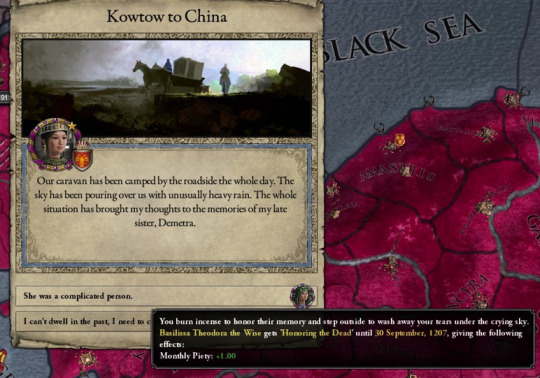
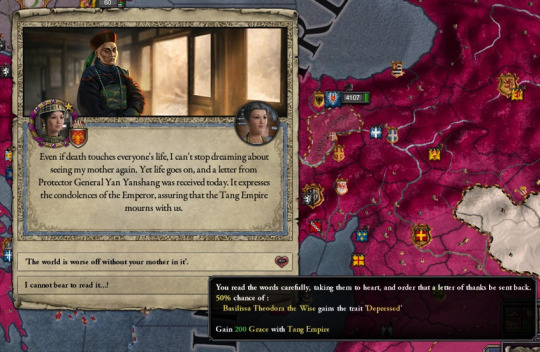
byzantine empire is 70% of my runs because I love being within China's diplo range and whenever I'm not the game feels lacking due to the amount of unique court events
#almost 1200 hours in and can you believe I have yet to play steppe. that's crazy#I've only explored like 50% of what this game has to offer
3 notes
·
View notes
Text
Paradise: Part Two
Pairing: Spencer Reid x Female!Reader
Word Count: ~2.2k
Summary: Spencer finally meets your parents, but it doesn’t go as well as you thought it was going to go. Are you a bad girlfriend for letting your dad treat him that way, or is it completely out of your control?
Warnings: canon violence, canon language, canon talk of death, methods of kill
Author’s Note: I do not own anything from Criminal Minds. All credit goes to their respective owners. If there are any warnings that exceed the normal death/kills from the show, I will list them. If you’ve seen the show, then it’s the same level of angst unless otherwise stated

x
A small-town diner will have a lot of gossip that filters through, so it's the best place for information. You walk in with your two coworkers, and you're overwhelmed by the amount of people that are inside. This place is very busy for a place that's in the middle of nowhere.
"Be right with you," one of the waitresses says as she passes by you.
"It's not even lunchtime yet," Derek mutters to you as you three take a seat at the bar counter.
"The sign said people will travel for miles for Flo's Donuts," you shrug.
"Sorry to keep you waiting." The same waitress who passed you by is now behind the bar. Her name tag says her name is Betty. "Would you like a dozen to share?" You take out your badge and show it to her, and she realizes how serious this is. "Ooh. FBI."
"Ma'am, we're trying to trace the steps of a couple that may have been here a few days ago," Derek says.
"Darlin', I've waited on eighty-seven folks since we opened this morning. Somebody would have to come through here doing cartwheels on fire for me to remember."
"Would you take a look anyway, please?"
You take out the photos of the latest victims and show them to her.
"Huh! Well, I'll be. I do remember them."
"Were they doing cartwheels?"
"No, but I was. The lady left me a $10 tip for breakfast two days in a row. Nice couple. Are they in some kind of trouble?"
You don't want to give too much away, so you keep it sweet and short. Since the Gallens were here, then that means they were staying somewhere close by. Sherwood is a town that's on the east side of Lake Tahoe near the California state line. This area has over three hundred hotels, motels, and resorts. Penelope sent over every single phone number and address to everywhere the couple could have stayed.
Instead of going to three hundred businesses, you have to narrow down the list. Then, you'll be able to go door to door and show pictures of the Gallens in hope someone knows who they are. This process could take days or even weeks, but you don't have the manpower to make it go by faster.
At this point, what choice do you have?
It took all night to narrow down the list, so you had to pick this up the next morning. Everyone had been up late working on the list, so when you walk into the station the next morning, you see takeout containers everywhere.
"Morning JJ," you greet with a yawn.
"Sorry for the wake-up call."
"It's fine. I'm always tired," you wave her off.
"It looks like we've got a possible missing person," JJ says. "Ian and Abby Corbin were in Reno for the weekend. They were supposed to be home yesterday in San Luis Obispo. They could've driven right through Sherwood. They've already been missing a night. His mom's looking after their two kids."
"Call me when everybody gets here," Hotch says.
JJ turns to the table where all the take-out containers are, and she grimaces in disgust.
"What is this? Left-over Kung Pao chicken? That's disgusting." She picks up the containers and tosses them in the trash, and she notices the sheriff staring at her. "What?"
"The smell of Chinese food makes you sick, but you don't even flinch when you look at those pictures?"
JJ looks uncomfortable by his comment, and you're quick to jump in.
"JJ is the toughest woman I know."
"Thanks," she whispers to you.
"Here, eat this. This should help with your sickness."
You hand over a good snack that her baby boy will enjoy. She smiles and takes the snack gratefully. Soon, the rest of your team gets to the station, and the Sheriff gathers his men for the profile.
"Ian and Abby Corbin have already been missing for over twenty-four hours, which means we may only have until tonight to find them. According to their families, they left Reno yesterday and were planning on stopping somewhere for the night. They didn't use a credit card. Unless they travel with a lot of cash, the room wasn't too expensive," Hotch begins.
"They were not traveling on the interstate. That eliminates over half of our previous search," Emily adds. "It sounds like we're looking for somebody who works the night shift at a back road motel, and we think he's most likely in his early to mid-thirties."
"Why is that?" the sheriff asks.
"Abducting couples is an ambitious task, and this guy's had time to perfect his skill."
"He could be older."
"Don't get hung up on his age. That's the hardest thing to predict," Rossi says.
"What we do know is that females take extensive beatings from him. That, combined with the sexual assault, tells us he's a violent anger excitation rapist. A sexual sadist like this can't get off unless he's torturing and watching the effects on his victims," you state. "That part of the torture is psychological. This is another reason he takes couples. Chances are he forces one to watch his power over the other."
"Because only the women suffer sexual torture, he's likely a malignant misogynist. This typically stems from an extreme hatred towards a woman who was relentless in her psychological and physical abuse," Emily adds.
"How do you know the dad wasn't the abusive one, and he's just continuing the cycle?" the sheriff asks her.
"Only a woman could make him hate women this much. The idea of the 'terrible mother' is best illustrated in world mythology by the negative aspects of the great mother. Instead of nurturing her children, she destroyed him, and given this upbringing, it's highly unlikely he'd ever been in a relationship let alone been married."
"Since he works in the service industry, he's forced to deal with a lot of people. So, he can probably hide his aversion to women until he gets them behind closed doors. With that said, we shouldn't rule out anyone with prior offenses toward women."
"Given the amount of time he spends with his victims," Hotch says, "he requires a great deal of privacy. He may even utilize an ATV to get away from the accident sites, so the property may back up onto an off-road trail. We should therefore concentrate on the most remote motels first. Thank you."
It's time to go door to door asking managers if they had seen the missing couple. There are too many properties to double up, so you have to go alone. After a dozen people have told you they know nothing of the missing couple, it's already sundown. Everyone has been working their asses off, and it seems like you're not getting anywhere.
You make it back to the police station when everyone gets through their list. No one has any good news, and you're about to collapse from how tired you are. Hotch is still out, and you're about to call him and ask if you can take a break when you get a call from your mom.
"Hey, mom. Did you get my message?"
"I did, sweetie. Your father and I are in town right now. Could I steal you away from your job for dinner?"
"Let me ask. Send me the address, and I'll let you know if I can or not."
"Okay, sweetie."
You quickly hang up on her and get Hotch on the phone. He's not too particular about you leaving, but since your parents are down the road at a local restaurant and you've finished with your list, he allows you to go. If he needs you and Spencer, then all he has to do is call, and you'll come right back.
"Spencer, let's go," you say and grab your jacket.
"Where are we going?"
"To dinner with my parents. We won't be long in case Hotch needs us back."
"Meeting the parents, huh? Good luck, man," Derek says and pats him on the shoulder.
You two take one of the government cars and head over to the restaurant, and your parents stand when they see you enter.
"Mom! Dad!" you grin and give them both a hug. Your dad holds you for a tad longer than your mother, but you don't think anything of it. "I'd like you to meet Spencer Reid, my boyfriend. Spencer, this is my mom and dad, Julie and Joey."
Your dad immediately stiffens up, and you look at him to see his eyes seething red with anger. He's trying to hide it, but you can see the underlying threat in his eyes.
"Be nice," you whisper to him before taking a seat in the booth with Spencer next to you, and your parents across from you.
"Spencer, it's nice to finally meet you," your mom says with a smile.
You wanted nothing but to enjoy dinner with your parents, but you can feel the tension in the air even without your abilities.
"It's nice to meet you too, Mrs. Y/L/N."
"So, how did you two meet?" your dad asks.
"We met at work. I had just started and he helped me learn the ropes. It wasn't until about seven or eight months after we met that we started dating." You think about Lila Archer, and how he was smitten with her. Man, that seems like so long ago. "He's a doctor, you know."
"Y/N," Spencer blushes.
"Really?" your mom asks.
"Yeah. He has three PhDs, three Bachelor's degrees, and specializes in statistics and geographical profiling. He's very smart," you grin proudly.
"You're in love with him, aren't you?" your mom asks.
"I am."
"You're too young to be in love," your dad snaps.
Your dad stares at you with an unreadable expression on his face. He looks at Spencer and holds his utensils with a grip so hard that his knuckles turn white.
"Dad, I can feel your anger. What is the matter?" you sigh.
"Nothing," he shrugs.
Your mom places a hand on his shoulder, but he shrugs her off. You're not sure what's causing this behavior, but you try to ignore it. Even after the food comes, your dad still holds a sour look on his face.
"Okay, seriously, what is your problem?" you ask, tired of his shit.
"Nothing. I'm fine." You glare at him, and he mutters something under his breath that you hear as clear as day. "Spencer isn't good enough for you."
You slam your utensils down on the table with a loud clang, and Spencer stays silent next to you.
"I love him, Daddy. That should be more than enough. We need to get back. Call me when you have a better attitude. Come on, Spencer."
You two slide out of the booth, and you toss down some money for the meal you know they were going to pay.
"I'm sorry, Spencer," you say when you get into the car.
"Don't be."
Still, you can't help but feel bad. You head back to the station, and when Derek sees the sad look on your face, he wants to question it. Spencer shakes his head at his friend, and Derek holds his tongue for now.
"Where are we at?" you ask, eager to get back into the case.
"Garcia found a connection between a motel handyman and Rebecca. They went to high school together. So, I thought maybe he was connected to other victims. It turns out he's not, but there's something else that all of the women have in common. Rebecca was found in a bra, a t-shirt, a skirt, and flip-flops. Johanna was found in a dress and sandals, and Melissa was wearing a bra, tank top, and jeans. None of them were wearing underwear."
"How do you know it was taken?" Spencer asks.
"Because they all packed it in their bags, but none were wearing it during the collisions. He leaves his victims in a car without their underwear and waits for them to be hit. A violent collision of metal against flesh. It's like the accidents are the final rape. This sexual aspect didn't show up overnight. This is something he's been building up to."
"So, this guy sees these collisions as some kind of rape?" The Sheriff asks.
"We know that an underwear fetish typically begins in adolescence with peeping in neighbors' windows. When that no longer satisfies them, they'll burglarize homes and start taking the object that arouses them."
"If they get away with that long enough, they become more confident. Then the object becomes the woman wearing it. That's when rape can occur. The one constant is they always take the underwear as a souvenir."
"Is it possible a pervert like this has ever been arrested?"
"There's a good chance a serial sex offender with an underwear fetish has been caught before."
"Right again, Agent Hotchner," Penelope says.
You didn't even know she was on the phone with the rest of the team.
"What is it, Garcia?"
"For the last two days, I've been searching through ViCAP for similar rapes and murders in cases that are still open. That has yielded me with diddly squat. So, I regrouped. I looked at some pictures of baby pandas. I went back in and I started searching for similar rapes and murders in cases that had been solved.
"Five months ago, this guy named Clint Barnes is convicted of five rapes that have been thirty miles away in Selbyville. Now, what's interesting, and by interesting I also mean icky and sad and wrong, is that Mr. Barnes only stole the undergarment of his last victim and she was beaten in exactly the same manner as our current victims. She was the only one who died," Penelope explains.
"The first four showed no sign of torture?"
"According to statements made by the survivors, yes. There were some questions about his performance. Things like, 'Did you enjoy it?'"
"That sounds like a power reassurance rapist. That doesn't fit his last crime at all," Spencer says.
"The last victim wasn't his. It was our unsubs."
"I'll push a rush through the DA's office," the Sheriff says.
With him asking the DA for the files from Selbyville, they come pretty quickly. He must know the DA for it to come that quickly.

x
Follow my library blog @aqueenslibrary where I reblog all my stories, so you can put notifications on there without the extra stuff :)
#criminal minds#criminal minds fanfic#criminal minds fic#criminal minds fan fiction#criminal minds fan fic#criminal minds fanfiction#criminal minds fluff#criminal minds angst#criminal minds series rewrite#series rewrite#cm season 4#spencer reid#spencer reid x reader#spencer reid fanfic#spencer reid fan fic#spencer reid fan fiction#spencer reid fanfiction#spencer reid fic#spencer reid fluff#spencer reid angst
43 notes
·
View notes